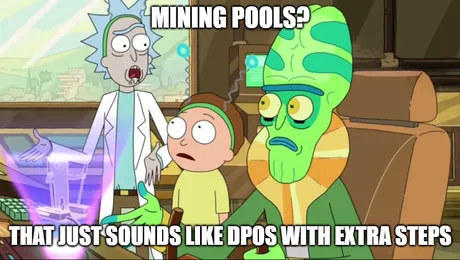
@theycallmedan has been sharpening his sword for quite some time on these issues. There are certain variables that make Hive a very unique network. Listening to him speak you'll hear a lot of buzzwords like 'premine', 'ico', 'layer 2', 'web3', 'web2.5', 'VC', 'governance', blah blah blah. At the end of the day it's a bit of a broken record, but it's necessary because the world doesn't understand these issues. We need to repeat the message while proving our 'theories' in 'practice'.
One of the most important issues is this concept of 'decentralization'. Many lose sight of what this word means, but more importantly why it is valuable. Decentralization would be totally worthless if we could 'trust' an efficient centralized arbiter. Decentralization is a highly inefficient process and centralization is the natural state that allows us to scale things up and make them more efficient. However, at a certain point it all breaks down (from greed and corruption) and we need to start over from ground zero. Crypto is the new infrastructure that the entire world will be built on.
With this concept in mind, it's a bit comical that a Bitcoiner would look at something like Hive and be like "that's a centralized garbage shitcoin". Hm, yeah, is it though? And if it was how does this person know whether or not the exact right amount of decentralization was sacrificed to get maximum efficiency in return?

In theory, Hive doesn't even exist.
In theory, Hive died before it was even created. It died when Steemit Inc went bankrupt and the remaining douchbag founder sold us down river to a vulture capitalist. In theory, DPOS failed in the most obvious way it was going to fail (money attack). Well, here we are, and we've proven in practice that all that theory-crafting was complete garbage. Welcome to the real world; a simulation that doesn't care about theory (unless it's Chaos Theory).
It takes an 'alien invasion'
What better way to unite the clans than by trying to attack and enslave them all from the outside? The way it all worked out was fascinating. Can't wait to relive my flashback PTSD while watching the upcoming documentary on it.
But is it even more centralized than BTC?
Decentralization is a spectrum... and that spectrum is on yet another spectrum, because there are a thousand different ways a network could be decentralized or not. That's a multi-dimensional cube of complexity that isn't very easy to parse, and yet people in crypto talk about such things like they have all the answers. They absolutely do not.
For example, Hive uses more data than Bitcoin.
Not only is the Hive blockchain bigger than the Bitcoin blockchain, but also the way in which Hive needs to organize the data is more complex as well. Hive nodes have to track indexes that deal with blog posts and the like, whereas Bitcoin nodes only have to track money because money is the only thing on the blockchain. These kinds of things can eat up a lot of RAM on a node/server, and RAM is expensive.
So in theory...
More people can run Bitcoin nodes because running a Bitcoin node is cheap. And in theory this makes the Bitcoin network more decentralized than other networks. But is this actually the case? And if it is the case, does it even matter?
This is where maximalists can get caught up and not realize the end goals of crypto. The end goal is to scoop up the best of both worlds and get the maximum amount of efficiency without sacrificing too much security/decentralization (if any).
So the question we must ask ourselves is simple: What is the actual real-world difference of a network running a thousand nodes, and another running ten thousand nodes? In theory, 10k nodes is 'more decentralized'... but what if it's only 1% more decentralized/secure than it was before? That means we just did x10 the work and only got a 1% gain. The diminishing returns of decentralization are a very real thing. It's not an efficient solution, and it's not meant to be. Sacrifices must be made.
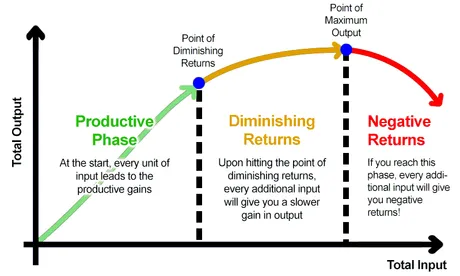
Work smart not hard.
If the point of decentralization is trust, a network only needs to be just decentralized enough to actually work. Making something more decentralized just because it has to be more decentralized because decentralized is totally missing the point. How can we expect people to build cool stuff if they don't even understand the thing they are building on top of? Many will get trapped in a box of their own theory-crafting which has no actual bearing on the real world.
So yeah... Bitcoin has a lot of nodes and they are cheap...
But nodes don't even control the Bitcoin network; hashpower does. And what do we see happening with 99% of all hashpower in the world? It gets delegated away to an off-chain mining pool. Well, shit... that's just DPOS with extra steps!
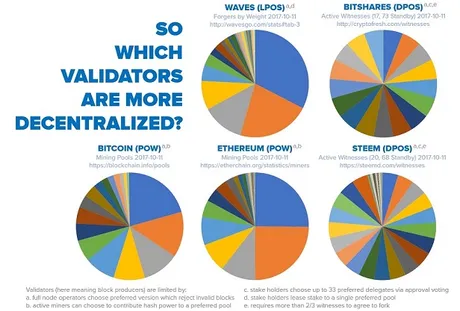
These charts are super old... let me check the date on the file... created July 8th, 2018. Wow. So these numbers could go as far back as 2016 depending on how old they were when I copied them, but still they are surprisingly very relevant to the current situation.
I'll be the first to admit how much shit I talked about these visualizations, especially during the heat of the hostile takeover where one person controlled all twenty consensus witnesses. I still think we should reduce the number of witnesses people can vote for, but as the Hive distribution gets more and more decentralized, the system we have now is the better one. It's a weird numbers game.
For example, when we give everyone 30 votes, in order for a black-hat witness to get into the top 20, they're gonna need a crazy amount of money (like 80M Hive?). Once that happens, the black-hat can take over every witness node and we'd have to do another hostile takeover fork.
However, what if we only had 1 vote?
Then it would be extremely difficult to take over a supermajority of witnesses, but it would be exponentially easier to get a single black node into the top 20. Even if we knew this was happening, it wouldn't be worth forking the entire network to get rid of the black-hat, and we'd just be stuck with one of our consensus witnesses being a total dipshit, exploiting our network to the fullest while we just have to sit there and take it.
So which one of these options is better? I used to think less votes was a good idea. Not so much anymore now that we've already proven that a hardfork is a viable option to cut out the cancer of systemic failure. Force the attacker to spend a ton of money and make us all rich, and then lose all their stake via hardfork, is perhaps the correct course of action that we've already proven works. Simply the threat of it happening will likely prevent it from happening. Weird how that works out.
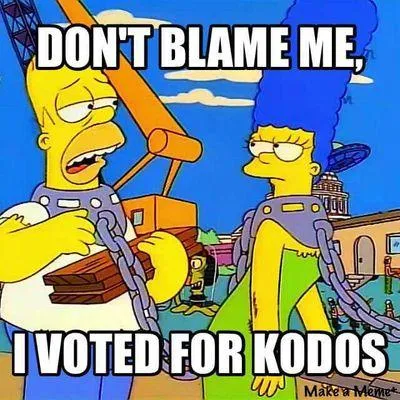
So it truly is 20 consensus witnesses on Hive vs.. a handful of Bitcoin mining pools?
Pretty crazy when you think about it. Centralization is the natural state even when the intended goal is decentralization. On a fundamental human level people simply crave the consolidation of power and the convenience that it brings. Those who fight against this end up getting eaten by the bigger fish.
So rather than Hive trying to build a system that tries to be decentralized just for the sake of decentralization, we instead created something that leans into the tendencies of what we see are bound to happen in practice. 20 block producers is better than half a dozen block producers. Even though Hive looks horribly centralized on paper to a maximalist, it is arguably more decentralized given the actual reality of the situation we find ourselves in. Not that this is a competition or anything. Hive and Bitcoin synergize together quite well, contrary to what a maximalist would tell us.
It all comes down to the token distribution.
This is the main difference between DPOS and POW. It doesn't matter how many billionaires buy up all the Bitcoin. Those coins don't get a vote like they would in a DPOS system. Mining governance and token distribution are totally separated within a POW system. There are advantages and disadvantages to this implementation. For the most part Hive is so different than Bitcoin that it's difficult to even compare the two.
For example, there's a lot of left-wing propaganda floating around that Bitcoin "wastes energy". This is an easy claim to make because it's very easy to reverse engineer hashpower back into energy consumption, and most people do not understand the complexity of either Bitcoin nor the economy itself, so making the claim that "100% of the energy Bitcoin uses is a waste" is a very easy thing to do. People are ignorant of the situation and blindly trust propaganda disseminated from the institutions that Bitcoin threatens.
In reality, the ability to convert energy directly into a currency controlled by no one on-demand anywhere on Earth is a legit miracle. Not only that, but this process of mining also provides Bitcoin with uncrackable security, in addition to providing access to an infinite amount of unhackable random numbers every 10 minutes (something developers haven't even been utilizing yet). Hive doesn't do any of these things, and it doesn't need to. This is why we have Bitcoin. Every platform gets a niche.
The implied synergy here is massive, but most users ignore it, instead opting to regress back to their competitive tribalist nature where everyone outside the little group is the enemy. That's not an attitude that will get you very far within this emergent cooperative abundance economy. Our entire perception of community and the world itself needs to change.

Advantages of Hive:
Distribution
There are many things that Hive does that other networks simply don't do. For starters our token distribution system, for all its flaws, is working. "Proof-of-brain" isn't real, but it doesn't need to be. Decentralization of the token is happening. Compare to something like DEFI where everyone 'auto-upvotes' themselves by design (yield farming) and we see that Hive is already superior to that in every way. Every time a user on Hive upvotes someone that isn't themselves, decentralization happens. There's no need to get hung up on the exceptions to the rule. The exceptions prove the rule.
Built in governance.
If Bitcoin devs (or any other crypto) need to collaborate on the direction of the network, how do they go about doing this? Twitter? Slack? Discord? Insert_WEB2_Server_here?
Sure, you can argue that people on Hive do the exact same shit. Discord is super convenient; I use it all the time. However, if I was banned from Discord or Twitter or Reddit or Slack or whatever else, do you think I would get down on my hands and knees and beg for my account back? Fuck no. Fuck those fucks. Yet I've seen hardcore Bitcoin maximalists do exactly that. It blows my mind. @theycallmedan has posted screen shots of this on his Twitter feed. Like, wut? No. Obviously there is a vacuum here that needs to be filled; likely by Hive itself. Communications matter.
Built in communications
The ability to communicate on chain with encrypted transactions is a huge huge advantage on Hive. Not only can we know for certain that a particular person said a particular thing beyond any reasonable doubt, but also we can fully encrypt that message with memo keys so that only certain users can read it. Super useful stuff for a layer one (especially one that is under attack).
Meanwhile, if Bitcoin or Ethereum need to vote on something... how do they even do it? In fact, who even controls the network? The devs? The miners? The stake holders? Who? Who makes the decisions? lol. On Hive governance is baked into the cake. DPOS itself is a voting mechanism. We can vote on anything we want and communicate our intentions directly on chain with no middle man to worry about. That's powerful. Even though we centralized all the governance to the stakeholders, that centralization was more than worth it.
Account recovery
It's always worth mentioning account recovery as well. Account recovery on Hive, while not used very often, is a huge advantage for long term viability and security. Who's going to put their entire net worth into a wallet that could be stolen instantly and is impossible to reclaim the theft? That 'solution' is inherently centralized, even if the person is using an airgapped hardware wallet. A simple '$5 wrench-attack' wins.
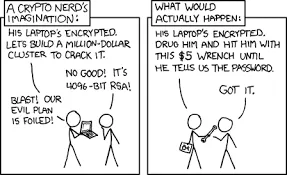
This becomes a much more complex issue when the money is timelocked and the account can be recovered after the fact. Nothing is perfect, but Hive is way ahead of the game in this department.
Built in delegation
On Bitcoin they had to create off-chain delegation solutions in order to scale up the mining process. If a hobbyist buys a $3000 Bitcoin miner, they'll never be able to mine a block (or at least statistically not). Thus mining pools need to exist so that Bitcoin could even scale to the levels we see today. There was no other option.
Delegations on Hive are again baked into the cake. We lean into these things rather than leaning away from them like a purist maximalist would do. We can delegate our governance votes away. We can delegate our inflation powers away. Soon we will be able to delegate bandwidth itself. Again, that's powerful. We are doing things on-chain that other networks are forced to do off-chain (and then they foolishly claim that doing it on-chain isn't decentralized). Yes, trusting a WEB2 service and floundering about with zero-infrastructure layer 0 politics is such a good option (not).
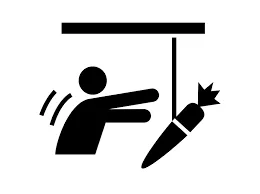
Build-in incentives
OMG Bitcoin nodes are so cheap to run, therefore everyone is going to run one! Uh, wut? No they aren't. Are you running a Bitcoin node? I'm not running one... why would I? What incentive do I have to run a Bitcoin node? Spoiler alert: I have no incentive to run a Bitcoin node so I'm not going to run one. It doesn't matter how cheap they are. Unless the cost is zero I'm not going to do it.
This is something that @theycallmedan understands very well with the advent of the Speak network. There needs to be an actual financial incentive for users to run infrastructure. A network can't scale up if it lacks these incentives. No one wants to run infrastructure for free "just because". Relying on altruism to scale up is absolutely not an option.
The only entities that have a financial incentive to run Bitcoin full nodes are basically the mining pools that depend on them to secure the chain and get paid for doing so. Bitcoin only pays miners; it does not pay people to run nodes. The nodes are an afterthought. While this is good for security and keeping inflation low, it's not so great for scaling up. Again, this is Bitcoin's niche: security. As we all know, most people will choose convenience over security. That's just how it is.
So over on Hive we have many more incentives in play that allow for at least twenty huge scaled up nodes to be in play at all times. We actually pay the node-runners directly, and we vote on the best ones. It's a superior system in practice, but not in theory. This is what throws people off. What works on paper doesn't necessarily work in the wild.

Humanity craves a republic (delegation of power)
Centralization of power is the natural state. Efficiency is key. Convenience is key. A republic posing as a democracy is the natural evolution. People just love to delegate their power to others and let them have the responsibility of running things. DPOS is the cryptographic representation of a republic on the Internet. We've cut out all the middle men and dived right in to where this was all going in the first place.
However, Hive (DPOS) is superior to traditional republics in basically every way. For starters, we control a currency. Does the USA control a currency? What about France or Germany? No, the banks control the currencies. We are all debt slaves to the banks. DPOS removes that middle man and gives the power back to the government.
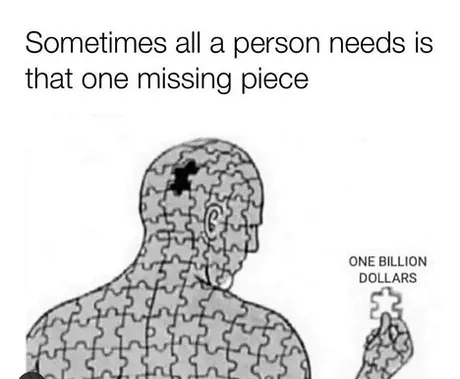
Leaning into greed and incentivizing it in a healthy way.
So imagine, if you will, several greedy billionaires on Hive. All they want to do is make more money. They greedy, but we love them. Why is that? Because billionaires on Hive are going to be looking for ways to increase the value of the core token. If number goes up, everybody wins.
Now compare this with billionaires today. When Musk or Bezos or Zuckerberg or Gates make a shitload of money, does anyone cheer? Is anyone glad they made billions? No, fuck that and fuck them, they are the enemy. Do you know why? Because we don't control the money. They make a billion USD... who controls USD. Not us! The entire game gets flipped on its ear when the billionaires are making billions... but that value is stored inside of a currency that we actually control and earn yield on. See how that works?
How else is Hive superior to traditional republics?
Well, it's impossible to hack the voting system. Many would point to the fact that the richest people on Hive are going to be controlling the system. Hm, yeah, sure, but also the richest people on Hive have a financial incentive to bring value to Hive, and it is 100% impossible to hack voting on Hive. Every vote is signed with a private key. It's not like some mystery van full of ballots can pop in at 3 AM to be counted at the last second. Again, this is something that most people are not fully grasping. Imagine what happens to republics when the voting systems can no longer be hacked in a provable nature. That's a lot of trust gained and a lot of corruption cut out of the system.
We can "vote the bums out" instantly
When someone fucks up, fuck them they are gone. Today, not three years until the next election. Crypto moves exponentially faster than the legacy system. Soon enough the tipping point will be reached and these advantages will be undeniable.
Votes actually matter
When I vote in a traditional republic... oh wait... I've never voted ever... because the system is rigged and I refuse to participate in a rigged system. However, when I vote on DPOS I know that my vote actually counts.
In a one-person-one-vote system, those who control the information control the election. Propaganda changes votes; money changes votes. Most elections don't even need to be cheated because they've already been legally hacked decades ago. They know exactly how to get what they want, when they want it. Hacking the legacy republic systems is somewhat of a perfected science. Notice how they don't want anything to change because that would ruin all their strategies. Gotta keep that electoral college in play, because reasons. Gerrymandering is a real thing.
On DPOS all of this is chucked out the god damn window.
Defenestrate all that nonsense.

The users with the most to gain and lose are the ones making the decisions. Again, not a perfect outcome, but much better than all the other systems we have today. And it's a scalable solution that can grow much bigger than something like a commune (aka communism which ends up devolving into absolute power for the leaders).
Again, it all depends on the distribution of the token and the stakeholders themselves. Hive has a good distribution mechanism, and we've have shown true decentralization over time. Pretty impressive considering all the shit we've been through over the years.

Conclusion
People like myself and @theycallmedan repeat ourselves a lot. We have to. Not only to get this information out to others, but also to reinforce and rehash the ideas for ourselves. These are very complex mechanics that need to be stated and restated over and over again to be fully understood. This is especially relevant given all the misinformation out there and rampant tribalism and propaganda that we get subjected to on a day to day basis.
Hive is in a pretty awesome spot. Bitcoin as well. These are definitely my main two tokens by far at this point. I've "centralized" my holdings accordingly. No one crypto is going to take over everything. Every viable network will have a small niche that it provides to the greater whole. Such is the nature of a decentralized system that seeks to scale up.
Bitcoin's niche is security. Hive's niche is voting/governance/communication. When hashed out those are pretty much all the same thing. There is no communications network out there that is even close to our level of decentralization, and there likely never will be. This is a race, and we are half a decade in front of everyone else. That being said the finish line is a place where everyone is rewarded (not just those on Hive). Such is the nature of abundance.
Hive leans into the issues that other networks shy away from. Delegation of power is going to happen no matter what. Money is going to control the world no matter what. Only by leaning into these unavoidable outcomes can we start to bend them to our will. Those who shy away from these issues because they aren't ideal are going to find out the hard way: that's not how the world works. There is no Utopia waiting for us; only more problems to solve after we crack the current set.
Return from Mining Pools: DPOS With Extra Steps to edicted's Web3 Blog
